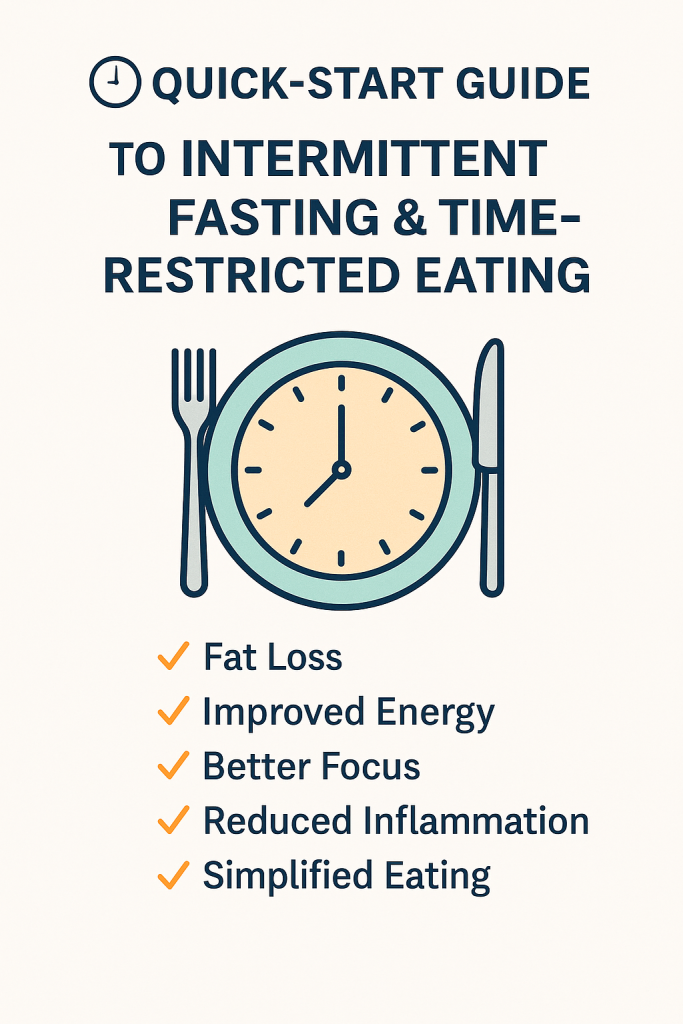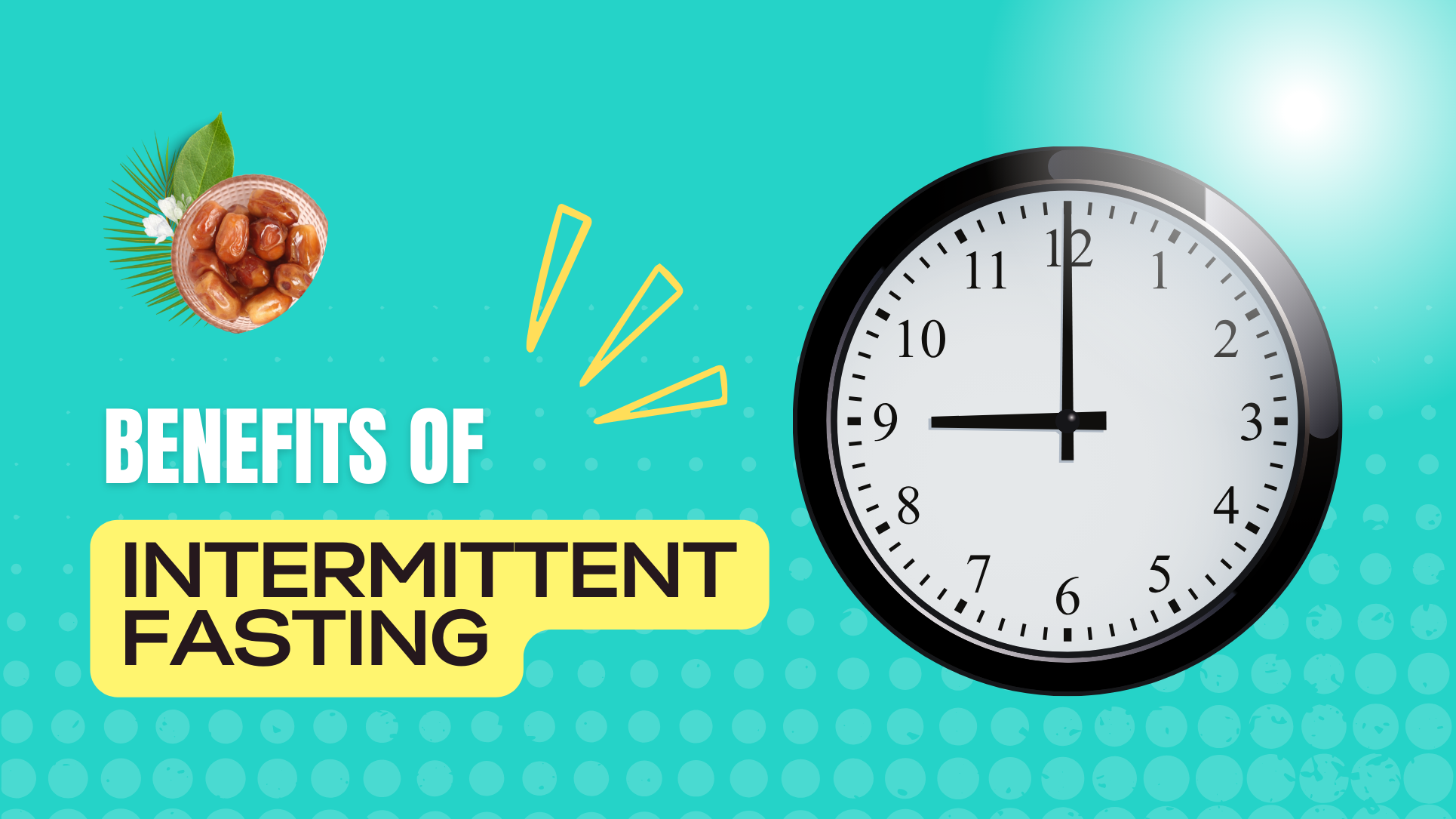Intermittent fasting (IF) and time-restricted eating (TRE) are two of the hottest topics in health and wellness right now — and for good reason. These eating strategies don’t just help with weight loss; they can transform how your body handles energy, reduce inflammation, and even sharpen your mind. Whether you’re fasting to lose weight, balance hormones, or boost longevity, you’re going to love what the science (and real-world experience) is showing.
Let’s break down exactly how intermittent fasting and time-restricted eating can benefit you — and why it’s more than just another diet trend.
🔥 What Are Intermittent Fasting & Time-Restricted Eating?
- Intermittent fasting (IF) means alternating periods of eating and fasting — for example, fasting for 16 hours, then eating within an 8-hour window.
- Time-Restricted Eating (TRE) is a type of intermittent fasting where you eat all your meals within a set time each day, like 10 a.m. to 6 p.m.
✅ Benefits of Intermittent Fasting and TRE
1. Weight Loss (Without Counting Calories)
Fasting naturally reduces how much you eat by shortening the eating window. Most people effortlessly eat 300–500 fewer calories per day — not by starving themselves, but simply by skipping late-night snacks or constant grazing. This creates a calorie deficit that leads to fat loss. Bonus: many report better portion control and fewer cravings.
2. Improved Insulin Sensitivity
One of the biggest health benefits is better blood sugar control. When you fast, your insulin levels drop — and over time, this makes your cells more sensitive to insulin. That’s a big win for those dealing with insulin resistance, prediabetes, or type 2 diabetes.
3. Reduced Inflammation
Intermittent fasting helps calm chronic inflammation — the root of many diseases like heart disease, arthritis, and even some cancers. By giving your body a break from constant digestion, you give your immune system time to repair and reset.
4. Better Heart Health
Studies have shown fasting can reduce blood pressure, lower triglycerides, and improve cholesterol levels. Combined with fat loss and less inflammation, it’s a powerful strategy for protecting your heart long-term.
5. Sharper Focus and Mental Clarity
Many people notice better concentration and mental energy when fasting — especially in the mornings. That’s partly because the brain loves running on ketones (your body’s backup fuel source when carbs are low), which are naturally produced during fasting.
6. Enhanced Cellular Repair (Autophagy)
When you fast, your body activates a process called autophagy — think of it as cellular spring cleaning. Old, damaged cells get broken down and recycled, making room for stronger, healthier cells. This is one of the reasons fasting is linked to anti-aging benefits.
7. Appetite Regulation
Fasting can help reset your hunger hormones. Instead of feeling like a slave to cravings all day, people often report feeling less hungry over time. That’s because fasting may reduce ghrelin (the hunger hormone) and balance leptin (the fullness hormone).
8. Supports Longevity
Animal studies have shown that fasting can extend lifespan and improve overall health. While we don’t have lifetime studies in humans yet, the signs are promising. Fasting mimics some of the effects of calorie restriction — which is one of the only known ways to extend life in nearly every species tested.

🧠 How It All Works
Here’s why fasting is such a metabolic game-changer:
- Fat Burning Mode: After about 12 hours without food, your body starts burning stored fat for fuel.
- Lower Insulin = Better Metabolism: Fasting lowers insulin, which helps your body release and burn fat.
- Cellular Cleanup: Autophagy kicks in, clearing out damaged cells and improving cellular performance.
- Hormone Reset: Growth hormone increases (great for muscle maintenance), and hunger hormones rebalance.
🕐 Popular Fasting Schedules
- 16:8: Fast for 16 hours, eat within 8 hours (most popular)
- 14:10: Gentler version of 16:8 — great for beginners
- 5:2: Eat normally for 5 days; restrict calories to 500–600 on 2 days
- OMAD (One Meal a Day): Intense method, but works for some advanced fasters
👥 Who Should Avoid Fasting?
While fasting has tons of benefits, it’s not for everyone. Avoid intermittent fasting or consult a healthcare provider if you:
- Are pregnant or breastfeeding
- Have a history of eating disorders
- Are underweight
- Take medications that affect blood sugar
- Have adrenal fatigue or serious chronic illness
Final Thoughts
Intermittent fasting and time-restricted eating aren’t just trends — they’re backed by science and changing lives. From fat-burning to brain-boosting, the benefits are wide-ranging and often easier to stick with than traditional diets.
If you’re tired of complicated meal plans and counting every calorie, fasting may be your best-kept wellness secret.

